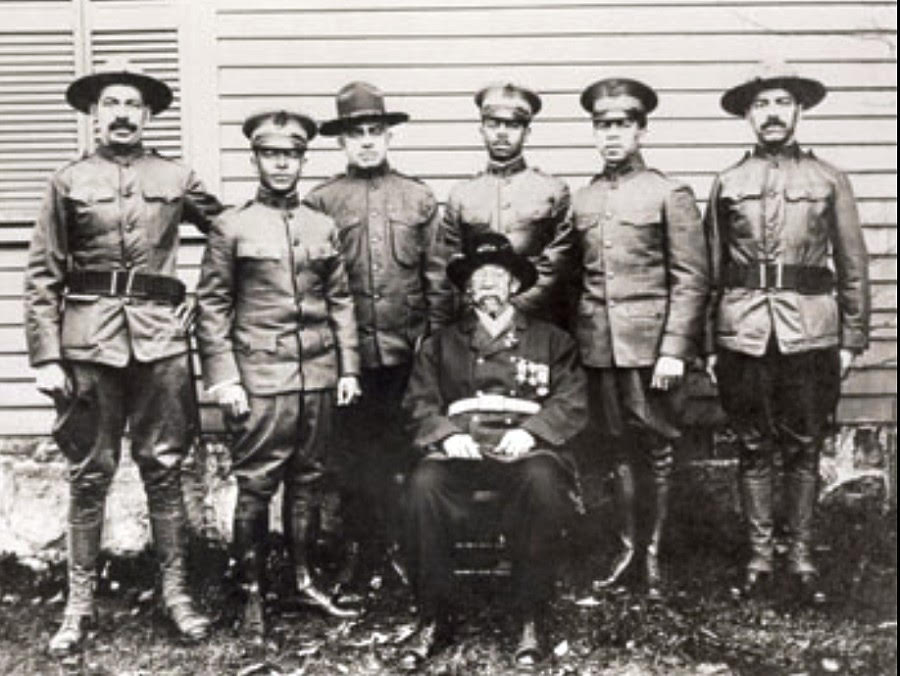A Most Daring Escape: The Tale of Former Slave, Union Navy Veteran William Benjamin Gould
6 min read
WILMINGTON, N.C. (Tribune News Service) — William Benjamin Gould likely held his breath as he stepped into a boat on the night of Sept. 21, 1862 and took his first step toward freedom.
In front of him was 28 miles of danger, as he and 21 other enslaved men used the cover of night and an ongoing epidemic of yellow fever to escape from Wilmington and rendezvous with the Union Navy off the coast of the Cape Fear. All they had to do was make it by boat from downtown Wilmington all the way down river to the ocean — without being spotted.
Everything rode on their discretion and these men certainly knew it. They had one chance and this was it.
Gould was born into slavery in Wilmington on Nov. 18, 1837 to Elizabeth Moore, a slave owned to Nicholas Nixon, who ran a peanut plantation on the outskirts of Wilmington. His father, Alexander Gould, was a white Englishman who migrated to the United States after the War of 1812 and initially settled in Granville County.
Nixon’s plantation was near the Pender County line today, but he also owned a home downtown on Chestnut Street, where Gould lived in the slave quarters.
Unlike many of those in his position, Gould was educated and literate, even though it’s unclear how he managed to do so in a time when Black people weren’t allowed such a luxury. More consequently for his owner Nixon, he was also a skilled plasterer, whom Nixon would farm out for a considerable profit.
He would notably make significant contributions to the beloved plaster work that’s defined the antebellum grandeur of the Bellamy Mansion, although it wouldn’t be discovered until the 1990’s when his initials were found covertly carved into his work.
Sometimes, slave owners would let their workers keep a portion of their earnings, maybe even enough to save up and buy their freedom. But it was not something that many slaves could bet on. No matter how much respect he got for his work or self-satisfaction he got from his almost-certainly-secret studies, Gould was still a slave and he was eager to break free.
He and his fellow conspirators saw their opportunity when Wilmington was plunged into one of the worst health crises it has ever faced in the fall of 1862 — the yellow fever epidemic. More than half of the city’s population had fled in fear of contracting the disease that would claim 654 souls. Those who couldn’t leave or stayed behind barely left their homes, making it possible for slaves to move about town without calling too much attention to themselves.
On the night of Sept. 21, Gould and the group of enslaved men tested that theory by convening at the foot of Orange Street and making a break for it. One of those men was George Price, who would go on to represent New Hanover County in the state House of Representatives and Senate during Reconstruction.
They made the journey down river slowly and as silently as possible. The loudest noise was probably their hearts beating as they inched closer to freedom.
They took turns at the oars as they hugged the shoreline and hoped they could move fast enough to reach the ocean before their owners noticed they were gone.
For Gould and all of these men, they were running from something but they were also heading toward something. A better future. The most precious privilege of freedom they weren’t allowed to have until they decided to take it.
The men made it safely to the blockade set up by President Abraham Lincoln at the outset of the war. Awaiting them were the USS Cambridge and the USS State of Georgia, which spotted the two boats just after 8 a.m.
Initially, the men would be considered contraband, a designation that Gould’s great-grandson, William Benjamin Gould IV, would later co-opt as the title of his book on his ancestor, “Diary of a Contraband: The Civil War Passage of a Black Sailor.”
As the title suggests, Gould didn’t just seek refuge with the Union Navy boats just outside the reach of the Confederacy and, therefore, his now-former owner. He and several of the other men he fled with joined the Navy, and he almost immediately began keeping a diary of his experience.
To enlist, he had to take what he referred to in his writings as the “Oath of Allegiance to the Government of Uncle Samuel” — what he called Uncle Sam.
His diary is an essential text for Civil War and African-American historians because it is considered to be the only known naval diary written by a former slave.
The entries in his diary range from simple location updates as he began his service to combat the very institution that had oppressed him his entire life, to the various battles and scuffles engaged in by the USS Cambridge and later the USS Niagara, on which he served.
He wrote about his daily duties, the captured Confederates his ship transported and often the weather.
On board, he was given the rank of First Class Boy, and later promoted to Landsman and Ward Room Steward. He was a low-ranking member of his ships, but he served with dedication.
He believed in the cause the Union was fighting for and he wanted to support it any way he could.
In his diary, he wrote that it was the “holiest of causes, Liberty and Union.”
Gould served for three years until he was formally and honorably discharged from the Charleston Naval Shipyard in Massachusetts.
Gould’s diaries wouldn’t be discovered for decades after his death, in old boxes given to William Benjamin Gould III.
The diaries cover his entire three-year service, save for two periods when he was hospitalized for the measles in 1863, and a time between Sept. 1864 and Feb. 1865 when they have not found any writing.
Now out of the service and with his full freedom, Gould would waste no time to marry his beloved Cornelia Williams Read inside the African Baptist Church on Nantucket Island, Massachusetts. The two likely met in Wilmington before she was bought out of slavery and moved to Nantucket in 1858.
Gould briefly reunited with Cornelia on his first leave in the spring of 1863 in Boston. During the war, the two exchanged at least 60 letters.
The Goulds finally settled in Dedham, Mass. in 1871, where they would have two daughters and six sons.
All six of his and Cornelia’s sons would serve in wars. The oldest, William Benjamin Gould II, fought in the Spanish-American War in 1898, while the other five all fought in World War I.
A now-famous picture of Gould surrounded by his six sons, all in their military uniforms, ran in The Crisis, the NAACP’s first magazine in December 1917.
Gould continued to pursue his own work later in his life. The plastering skills he learned in Wilmington brought him acclaim and recognition in Dedham, most notably restoring St. Mary’s Catholic Church. He was a founding member of the Episcopal Church of the Good Shepherd and served in the GAR, the Grand Army of the Republic on veteran’s matters, even ascending to the title of commander of Post 144 in 1900 and 1901.
He died at the age of 85 on May 23, 1923.
It was announced recently that Dedham is exploring its options for erecting a monument to Gould. He is already acknowledged on a North Carolina State Highway Historic marker outside the Bellamy Mansion, a small and necessary gesture of gratitude for his immense contribution to our knowledge of what life was like for a former slave who joined the fight.
Even when he was still with the Union Navy, Gould began corresponding with the Anglo-African, a black abolitionist paper that provided reporting for the black soldiers and sailors serving in the war.
He would begin contributing articles to the publication under the nom de plume, Oley. One of those articles detailed one of Gould’s few return trips to Wilmington after his escape.
He had returned in 1865 to find his birthplace to be a different city.
The slave auction block that once stood near Market Street was gone and the bell that once rang to inform slaves of their 9 p.m. curfew was silent. He saw black citizens actively involved with trade and commerce, and they filled the schoolrooms they were previously not allowed to be in.
The aftermath of the Civil War would not be a time of immediate or widespread acceptance for the African-African community. But what Gould saw was the beginning, something as a child in Wilmington he probably feared may never come.
“On the whole, Wilmington is changed,” he wrote.





